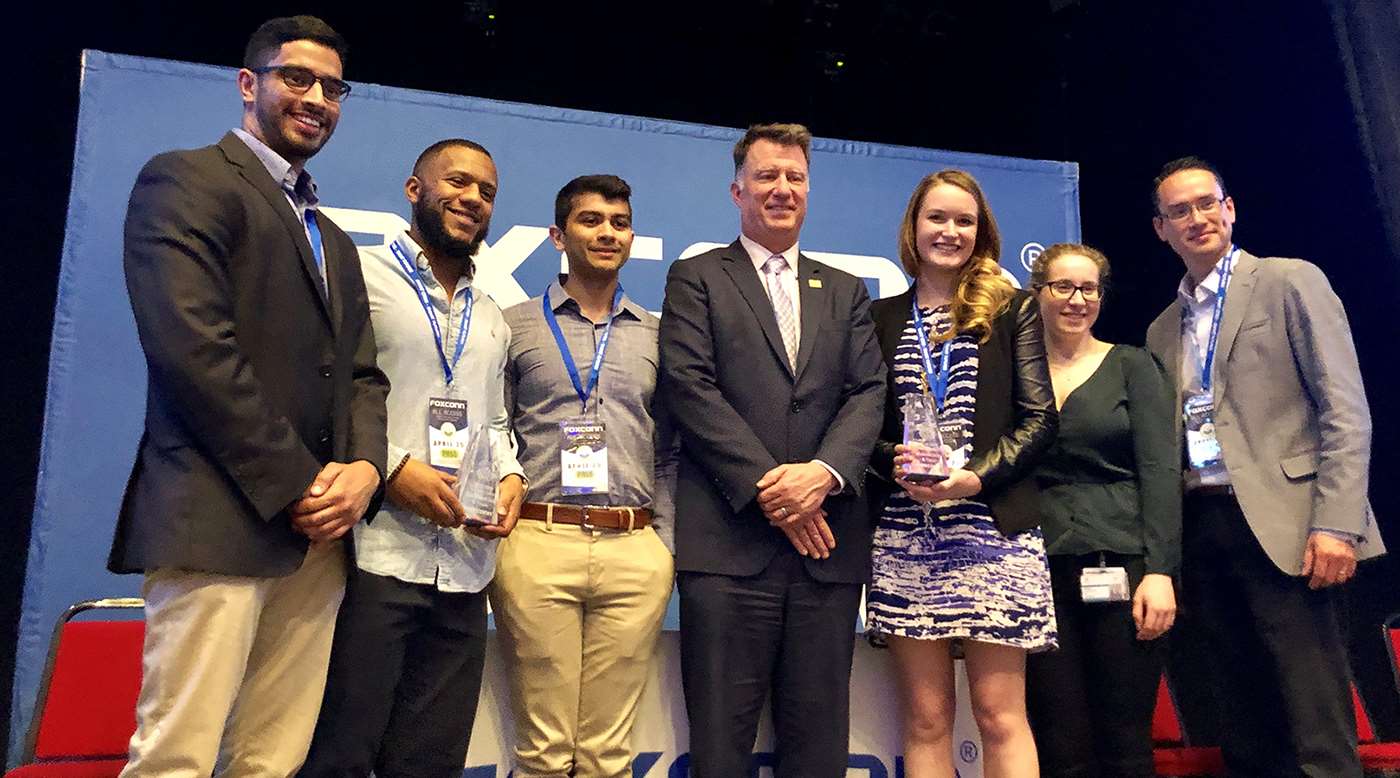Three MCW teams among dozen winners of Foxconn's innovation competition

Milwaukee, May 2, 2019 – Last week, the Medical College of Wisconsin learned that three MCW teams were recognized among 12 winners in a statewide innovation competition, Smart Cities – Smart Futures, sponsored by Foxconn Technology Group. Foxconn’s goal for this grant competition is to invest in a broad spectrum of new ideas generated by college and university teams throughout the state to improve the health and quality of life of Wisconsin communities.
Foxconn announced Smart Cities – Smart Futures in August, stating it would award up to $1 million over the next three years. The competition focuses on various themes, such as smart mobility, smart buildings, smart homes, smart energy and smart health, as well as efficiency, productivity and the management of resources. More than 300 teams entered the contest, including several dozen from MCW. On April 25, at an event at the Milwaukee School of Engineering, Smart Cities – Smart Futures representatives announced that 12 teams had been selected to receive $5,000 each to support their ideas.
Teams from MCW comprised exactly one-fourth of the winners and are led by faculty, staff and students.
“It was a privilege for me to attend the announcement of the contest winners and celebrate alongside three of our outstanding teams,” says Joseph E. Kerschner, MD, Dean of the Medical College of Wisconsin School of Medicine and Provost and Executive Vice President of the Medical College of Wisconsin. “They represent MCW’s ‘can do’ attitude which makes us such a wonderful asset to our communities and a vital part of tomorrow’s smart cities.”
MCW’s Smart Cities – Smart Futures winning teams are:
Michelle Botts, Devashish Joshi and Adhitya Ramamurthi, students, School of Medicine
Project Summary: Project aims to bring virtual reality modules to medical students and residents to assist in learning and medical exposure. Additionally, the project would target medical employees to train for emergency protocols and patients to ease anxiety about certain procedures.
Zak Sharif-Sidi, student, School of Medicine
Project Summary: Project focuses on the development of web-based technology that attempts to the close the gap between doctors and the organizations in our community. The solution solves this problem by integrating into the clinical workflow to algorithmically run community-level data against clinical data in order to identify and refer patients to specific resources in the community. The result is early risk identification with actionable next steps, identifying resources in the community and facilitating logical connections for patients to stay healthy.
Other Team Members: Bradley Crotty, MD; Mike Anderes, PT, MBA
Brandon Tefft, PhD, Assistant Professor, Biomedical Engineering
Project Summary: Project focuses on the development of a modern, computerized stethoscope that can produce 4-dimensional (4D) sound maps from a patient over space and time, which can be used to diagnose diseases of the heart, lungs, respiratory tract, gastrointestinal tract and joints. Furthermore, the system can be deployed into the community by using a smartphone app to capture the sound data and transmit the results to a physician, allowing for more frequent screening and earlier diagnosis and treatment.
Other Team Members: Shayan Shafiee
MCW’s Smart Cities – Smart Futures honorable mention teams are:
Jennifer Lindner, Project Manager, Information Services
Project Summary: Product is a Technology Integrated Home System that connects people with advanced technologies like augmented reality, mixed reality, artificial intelligence, internet of things, and smart devices to improve the quality of life, productivity, efficiency and convenience to all people without compromising efforts and achievements of future generations.
Anna Palatnik, MD, Assistant Professor, Obstetrics and Gynecology (Maternal Fetal Medicine)
Project Summary: Project focuses on the use of artificial intelligence technology and machine learning to reduce the risks of sudden infant death syndrome.
Shayan Shafiee, student, Graduate School, Biomedical Engineering
Project Summary: Project involves the development of a non-invasive means of detecting biomarkers in circulating blood or other bodily fluids that would enable earlier detection of diseases such as cancer and better management of diseases such as diabetes.
Other Team Members: Brandon Tefft, PhD
Keep up with the latest news. Sign up for Newsroom Alerts.
Latest press releases, stories and resources.
MCW Media Contacts
The media relations team at MCW is happy to assist in coordinating experts for interviews. Please reach out to us at:
media@mcw.edu
(414) 955-8764
Contact us


